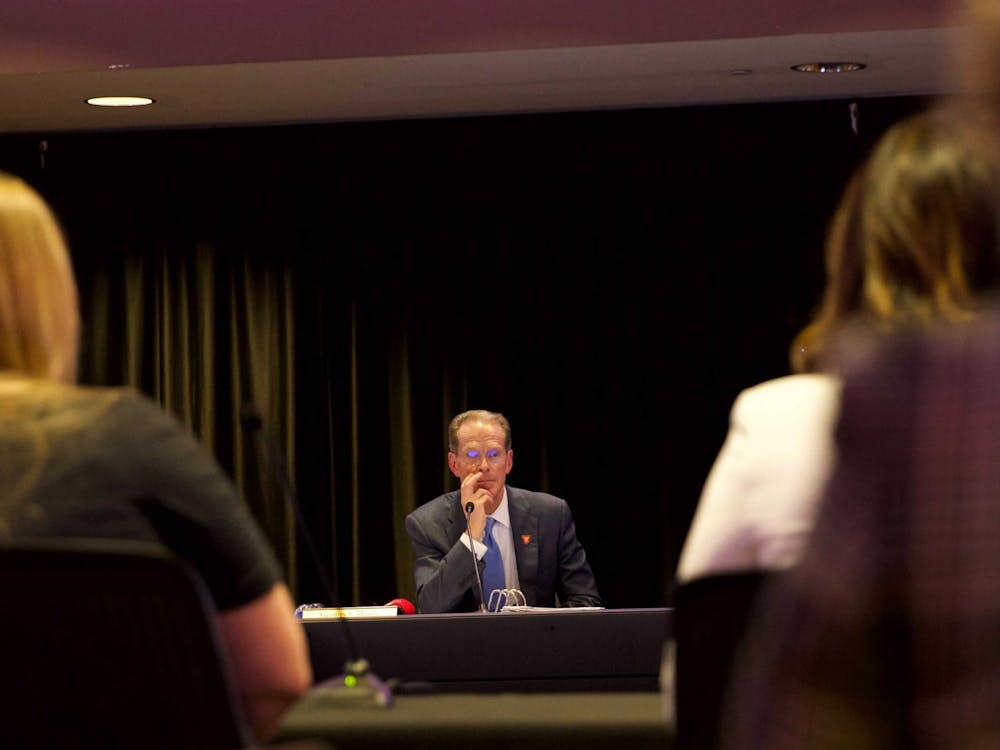Ball State President Geoffrey Mearns used his remarks at Ball State’s Board of Trustees meeting to address the concerns and complaints around Senate Bill (SB) 202, which was signed into law by Governor Eric Holcomb March 13. The legislation, which will become effective July 1, is intended to increase “intellectual diversity” in high education across the state.
“We will comply with the letter and the spirit of SB 202,” Mearns said.
There has been concern growing among Ball State students and faculty about how this would affect the quality of education and concerns about disciplinary actions for tenure who fail a mandated review of tenured faculty.
In his address, Mearns said the extended commitment to diversity “is not foreign to us at Ball State,” pointing to the university’s strategic plan which points out inclusivity as one of the university’s “enduring values.” He included that the university added a standardized test-optional admissions policy in 2018, there was a $5 million Multicultural Center built in the heart of campus and Ball State has the most diverse senior leadership team in the school’s history.
Mearns said with some of SB 202’s contents — such as policies regarding freedom of expression and educating students and faculty about such policies — Ball State already has such policies and there needs to be a “few modest changes” for it to comply with the new legislation.
Changes to the policies and practices will be presented to the board for consideration and approval in time for the June 14 meeting, Mearns said.
Mearns addressed the critics and skeptics of SB 202 and said that some of the concerns are “not well-founded because they aren't based on what is actually in SB 202.” He brought up the belief that SB 202 precludes a university from admitting an applicant or hiring someone if they provide a statement regarding diversity, equity and inclusion.
Mearns cited a preceding provision in the SB 202 text in his defense, saying the text instead prohibits an institution from requiring an applicant for admission or employment “pledge allegiance to or make a statement of support for either a discriminatory policy that's treats similarly situated people differently based on race, color, sex, sexual orientation or religion, or a political or ideological movement.”
SB 202 now requires some information about complaints regarding intellectual diversity to the Board of Trustees, as well as providing summary information to the Commission for Higher Education on an annual basis. Responding to the concern, Mearns says he is skeptical that this will cause people to file more complaints and foster a hostile culture on campus.
At the end of his speech, Mearns restated his belief that SB 202 would not force the university to backtrack on some of its core ideals and principles.
“We will sustain our commitment to this enduring value, our parallel commitments to both cultural diversity and intellectual diversity and our commitment to academic freedom,” Mearns said.
Rick Hall, chair of the Board of Trustees, believes that there are many positive aspects when it comes to SB 202.
“I am not troubled by this bill,” Hall said. “It affirms a lot of our core beliefs, and I think we'll continue to thrive.”
Update on the Village revitalization project
At the January meeting, the board approved further steps for the Village revitalization project. These steps meant that the project contracts could go through the state level, bringing some locations closer to construction.
Since the January meeting, progress has been made on all five of the Village sites. Alan Finn, vice president for business affairs and treasurer, presented the board with these updates.
One plot of land, on the intersection of Martin Street and University Avenue, has been repurposed from a mixed-use plan with space for retail and restaurants to a centralized public gathering space. This space will include both hardscaping and landscaping, and it will also include room for food trucks and other small-format retailers.
A letter of intent has been signed with Landmark Construction for another Village site, with the lands on North Street behind the Village Promenade apartments being affected. The plan is for a minimum of 25 owner-occupied homes, with a mix of patio homes and attached townhomes. There has also been a proposal to vacate a part of Dill Street to create a community green space.
Burris Volleyball honored with resolution
Muncie Burris’ high school volleyball team captured their 23rd state championship in school history in November, defeating Brownstown Central in straight sets. Burris is the second consecutive Delaware County school to win the IHSAA 2A Volleyball State Championship (Wapahani outlasted Linton-Stockton to win the state championship in 2022).
Mearns read a resolution that was subsequently approved unanimously by the Board of Trustees. It honored the team for their “level of courage, perseverance, and teamwork throughout the 2023 season.”
The resolution also honored senior Aubrey Miller, who received the Mental Attitude Award from the Indiana High School Athletic Association. The award also came with a $1,000 scholarship to Burris’ general fund in Miller’s name.
This is Burris’ first state title in volleyball in 13 years.
Contact Grayson Joslin with comments at Grayson.joslin@bsu.edu or on X @GraysonMJoslin.





